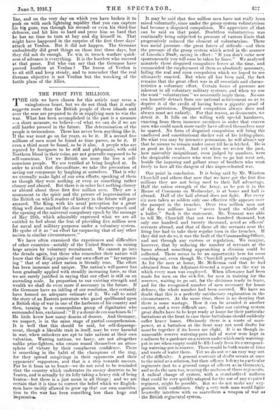TOPICS OF THE DAY.
THE BATTLE OF VERDUN.
ITERDUN is destined to give its name to one of the greatest battles in history. Already the tides of combat have ebbed and flowed on both banks of the Meuse for a hundred and three days, and still the end is not in sight. In the heat and fury of the fray it almost seems as if the Germans had forgotten what is the object of their advance, and the French exactly why they are determined not to yield to their foe. Of course, that is not really so. The Germans have a very definite plan to prosecute, and the French are determined to frustrate that plan ; but it is no wonder that on the surface the only object appears to be death to the foe. It is difficult, nay, impossible, to put into words what the ordinary English- man feels about the glorious character of the fight which the French are carrying on at Verdun. It is touching the British people in a way that no other battle in which their own flesh and blood have not been directly engaged has ever touched them. They watch with an admiration which is almost envious how the gallant French troops stand up to the torrents of shot and shell which are poured upon their lines—hurricanes of death to which the history of war affords no parallel. They see the bombardment by the great German guns conducted from points some six or seven miles away, and they note that the French artillery, though incomparable in the lighter pieces, is as regards heavy guns weaker in numbers, in calibre, and in carrying-power. Thus the German bom- bardment is conducted in comparative safety. They note also that as soon as the Germans believe that they have so battered the French trenches that nothing can live therein they send out their men to take possession of the line. Some- times they find that the artillery has finished its work com- pletely, and that nothing is left alive amid the ruins, which they then make their own. Often, however, the artillery has failed in its task, and out of trenches still in being arise the most alert and the most impetuous infantry on earth and hurl their assailants back to the cover of their guns. Then the artillery preparation, or, as it may be put, the work of making the trenches uninhabitable, begins again. It must not be sup- posed, however, that all is over even when the German guns have accomplished their dread task. No sooner has a com- pletely wrecked trench-line been occupied by the Germans than there falls upon it the full fury of the counter-attack— a counter-attack sometimes successful, sometimes a failure, sometimes half-way between the two. That is the course of the Verdun battle which all the world is watching.
Owing to the fact that the Germans have got an advantage in heavy artillery, there has been, if we take the battle week by week, a gradual advance on their part. It can, how- ever, only be described as slight. If we divide the number of kilometres gained by the number of days in which it has taken the Germans to make that advance, we shall find that at the present rate of progress it would take them some two years to reach Paris. If we make a similar calculation in men instead of kilometres, we find that it would cost them the whole manhood of Germany to reach Paris via Verdun. The people of England, as they watch the battle, do not, however, make these calculations. They are moved by simpler and more primitive considerations. They are begin- ning to be deeply moved by thoughts which can be put into such words as : " Why cannot we help the French at Verdun ? Why are we not fighting by their side ? How is it we are not lending the support and sympathy of our fighting units ? Surely our troops ought to be sent to relieve their war-worn troops, and to share in the glorious work of hurling back the German attacks." These thoughts are not only natural and honour- able, but almost irresistible, and yet it can be shown that they must be resisted, and that it would be unwise—a calamity of the first magnitude for France and for us—to obey what sounds like the call of honour. As General Haig notes in the despatch which we summarize elsewhere, the French have not asked for our assistance at Verdun. They have preferred that we should do what happily we were able to do with great swiftness and efficiency—release one of their great armies from holding a seqr of the trench-line and occupy it with our own troops. Careful reflection will show why the French have not asked for our physical support at Verdun, and why we have not pressed that help and support upon them. To discover the reason one has to ask what has been the German objective at Verdun. Why have the Germans pressed their attack with such amazing-fury and so terrific an expenditure of shell, with such appalling destruction not merely of life but of their best battle formations ? The true answer is not that the Germans still think they can hack their way to Paris, through Verdun or anywhere else. Though no doubt the abandonment of that view is not openly admitted even in the offices of the Imperid General Staff, it is none the less a fact that the directors of German military policy have long ago, given up the idea of fighting their way to Paris and entering the city as conquerors. The Germans are in the true sense on the defensive, though no doubt they are carrying into practice the maxim that the only true form of defence is attack. What they dread above all things is a well-planned, hard-pressed attack by the Allies, begun by great artillery preparation, and then pushed through with so much vigour and on so broad a front that the defenders must give way. The Germans of course do not know when an attack is coming or where. These are the x and y of the double equation. But they know that it must come some time and somewhere and soon. Now the only way to prevent it—to prevent what for every professional soldier is ex hypothesi the winning game—is to stop the attack. As every boxer knows, the only way to stop Smith hitting you is to hit him first, and hit him so hard that he is fully occupied in warding off your blows and has no time to begin an attack upon you. The blows of the Germans at Verdun are blows intended to prevent the development of a great attack by the Allies. They hope by pressing the French hard at Verdun to force the Allies to do the very thing which we have described the British people as being urged to do by the unthinking impulse of the moment. They want to compel us, and the French also, to throw our whole line into confusion, to alter all our battle plans, to give up all our carefully thought out enterprises—represented, as we have said, by x and y—in order to send divisions and corps pell-mell to the assistance of the troops now engaged at Verdun. Nothing could possibly suit the Germans better, or better make them feel that they had had a great success, and that the price paid for Verdun was well worth while," than to see British troops rushed to the eastern part of the line and joining in the Verdun battle. Especially would they like to see a movement of our heavy guns on a great scale. What the French have got to do, and what we venture to say General Joffre is fully aware that they have got to do, is to take their punishment with the calm courage with which they are now taking it. Though they may feel at heart that if the worst comes to the worst we can always bring them aid, they are none the less determined not to ask for that aid, because to do so would be to play the German game. Instead of playing the German game, what they must do, and what we must assist them in doing, is to compel the Germans to carry out the dis,astrous plan of campaien to which they have committed themselves—the plan of hurlingtheir troops against the defence in and around Verdun and making, let us say, a gain of a kilometre at the loss of two thousand men a day, or two hundred thousand in the hundred days. Cruel as it sounds, and hard as it is to bear the thought of the losses falling on France, the Allies must not be deflected from their main purpose by any con- siderations whatever. We British must console ourselves with the thought that our time is coming, and that the longer the battle of Verdun goes on the more worn-out the German forces will be and the less great will be their power of resistance when our opportunity arrives. People who take short, superficial, and unsound views of war may talk about our supineness. Any one who has a military instinct, or even a few grains of common-sense, will understand that by refusing to allow plans that have taken months to mature to be thrown over in a moment of generous exaltation we are causing the most deadly anxiety to the German General Staff. Our imperturbability may well prove their sentence of death.
But it may be said : " That.is all very well, but suppose that, while we are hugging ourselves with the delusion that we are going to beat the Germans in the end by refusing to help the French at Verdun, the Germans make one more great effort, and that effort turns out to be successful and Verdun falls— what then.? " Our answer is that even assuming this to happen, which we believe is most unlikely, the Germans will have gained nothing, because they will not have upset the battle plans of the Allies—Verdun is not the real German objective. If Verdun were to fall now, and the French line were to go back even twenty kilometres, the Germans would have accomplished nothing substantial. They would only find before them new lines of trenches, and must begin again the old wearisome work of advancing their big guns and making those preparations for taking trenches _which are the drag-chain of modern warfare. The only real road to conquest under new conditions is to break your enemy's line, and on the very day on which you have broken it to push on with such lightning rapidity that you can capture his big guns, run through his second- or even his third-line defences, and hit him so hard and press him so hard that he has no time to turn at bay and dig himself in. That might have happened in the surprise of the first three days' attack at Verdun. But it did not happen. The Germans undoubtedly did great things on those first three days, but they did not do enough. To win in trench warfare quick- ness of advance is everything. It is the hustlers who succeed at that game. But who can say that the Germans have proved hustlers at Verdun ? , The lesson of Verdun is to sit still and keep steady, and to remember that the real German objective is not Verdun but the wrecking of the battle plans of the Allies.



































 Previous page
Previous page